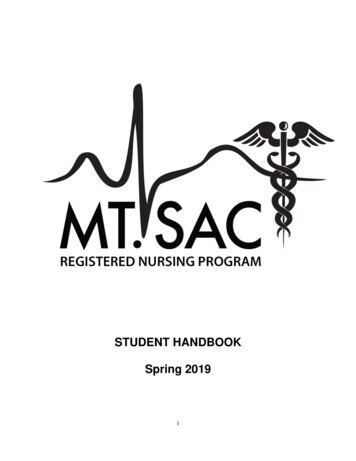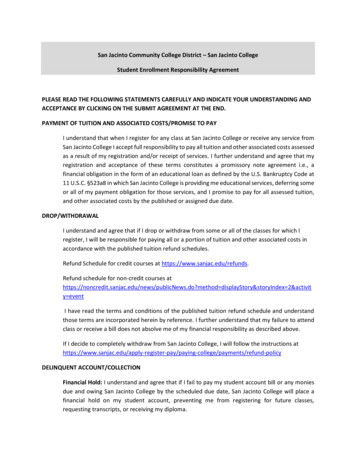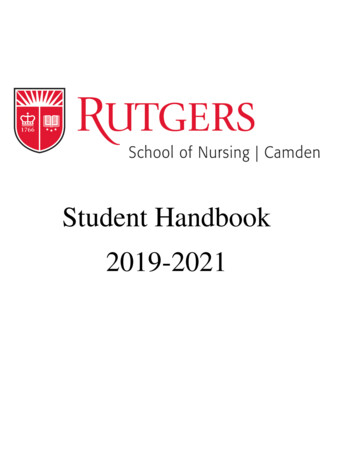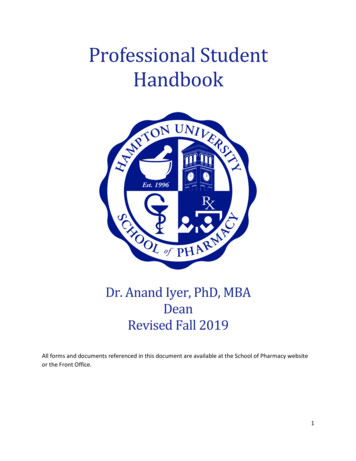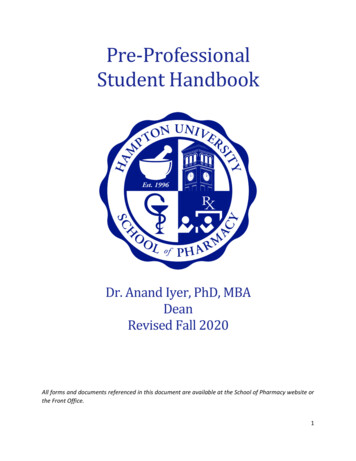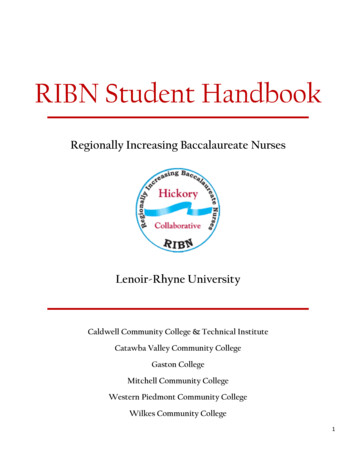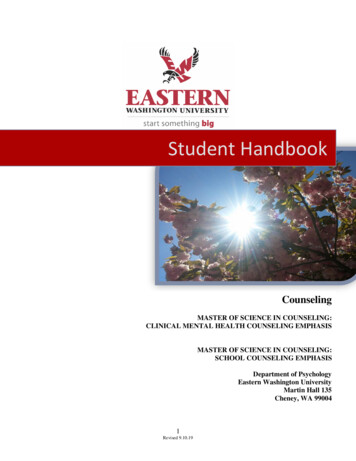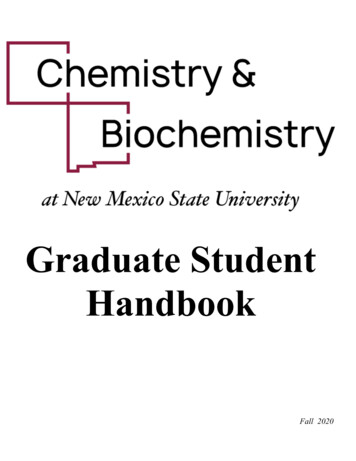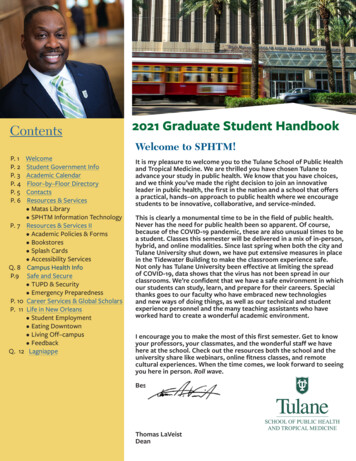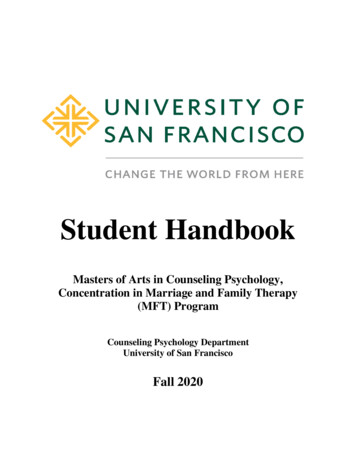
Transcription
Student HandbookMasters of Arts in Counseling Psychology,Concentration in Marriage and Family Therapy(MFT) ProgramCounseling Psychology DepartmentUniversity of San FranciscoFall 2020
Table of ContentsIntroduction . 3Additional Sources of Information . 4Core Faculty . 5Program Mission Statement . 6MFT 3-year Course Sequence . 8MFT 2-year Course Sequence . 9Advising Relationship . 10Student Conduct . 11Attendance Policy . 12School of Education Grading Policy. 13Probation and Disqualification from USF . 14Leave of Absence/Withdrawal . 15Resolving Student Complaints . 16Scholarship Information. 17USF Honor Code. 18Plagiarism . 262
IntroductionThe faculty and staff of the Marriage and Family Therapy / Professional Clinical CounselingProgram in the Counseling Psychology Department at the University of San Francisco welcomeyou. As you begin your education, training, and experience in the field of Marriage and FamilyTherapy (MFT) / Professional Clinical Counseling (PCC), you also begin a process of personaland professional growth. We wish you well as you begin what may become a lifelong process.This Student handbook has been created to serve as a guide for you as you traverse theMFT/PCC program. The handbook is designed to provide you with more detailed information asit relates to all aspects of the MFT/PCC program.Please read the manual carefully. Every effort has been made to present the information in aclear and concise format. Please pass on any comments concerning the style, organization,completeness, and clarity of the text so these may appear in subsequent revisions. We welcomeyour feedback.While the general curriculum requirements will not change during your time in the program,procedural changes and calendar deadlines will vary from semester to semester. Your advisor,instructors and student representatives will help throughout the program, but students areresponsible for keeping apprised of deadlines and ongoing requirements of the CounselingPsychology Department. We hope that that you find your experience in the MFT/PCC programto be fulfilling and meaningful. Welcome!3
Additional Sources of InformationMFT/PCC students need to consult the sources listed below for further information pertainingto their educational requirements for the School of Education and the University of SanFrancisco.University of San Francisco General CatalogThis USF document contains the most current information on Universityprograms, services, policies, and procedures. It is available from the USFwebsite at www.usfca.edu/acadserv/catalog/Statutes and RegulationsThis state document contains the laws and regulations relating to the practice of ProfessionalClinical Counseling, Marriage and Family Therapy, Educational Psychology and ClinicalSocial Work. It is available from the Board of Behavioral Sciences (BBS) website atwww.bbs.ca.govStudent Disability ServicesThe Office of Student Disability Services works to ensuring that students with disabilities haveequal access to all areas of student life and receive appropriate educational support and servicesto foster their academic and personal successGleeson LL 202130 Fulton St.San Francisco, CA 94117sds@usfca.edu(415) 422-26134
Core FacultyCori Bussolari, Psy.D.Her research is focused in the area of positive coping, as it relates to disenfranchised grief suchas pet loss, health related illness, bereavement, trauma and life transitions.Hsiu-Lan Cheng, Ph.D.Her research focuses on multicultural issues and mental health, attachment and affect regulation,and help-seeking attitudes and utilization of psychological services among diverse groups.Lisa De La Rue, Ph.D.Her research examines the intersection of trauma and correctional systems, with a focus on thevictim and offender overlap. Her work seeks to increase prevention efforts as a way to preventsystem involvement.Daniela Domínguez, Psy.D.Her research has primarily focused on advocating for a strengths-based systemic approach tofamily counseling, highlighting the experiences of LGBTQIA , Latinx, mixed-immigrationstatus, and Asian Indian American families.Belinda Hernandez Arriaga, LCSWWith a focus on community-oriented mental health work, her clinical work has focused onmixed-immigration status farmworkers and their families in Pescadero and surrounding areas.Leyla Pérez-Gualdrón, Ph.D., School Counseling ProgramHer scholarship is in the areas of social justice orientation and academic/civic engagement inurban youth; school relational and language climate; bilingualism; and racial identity.Jason D. Reynolds (Taewon Choi), Ph.D.His scholarship is in the areas of Identity development; transracial adoption; names; mentorship;racial and ethnic socialization; and treatment of complex trauma.Christine Yeh, Ph.D.Her scholarship is in the areas of ethnic identity, coping, mental health services and indigenoushealing among People of Color. Additionally, she focuses on immigrant and refugee culturaladaptation and acculturation, school-based interventions for immigrant youth, community-basedservices for Asian American and Pacific Islander children, youth, and families.5
Program Mission StatementThe Masters in Counseling Psychology Program with a concentration in Marriage and FamilyTherapy (MFT) at the University of San Francisco prepares students to be socially and culturallyresponsive relationship and family therapists and mental health counselors. At its core, theMFT’s clinical training program upholds values of equity, social justice, community and culturalwealth, and collaborative problem solving. We are committed to embracing diversity, academicexcellence, and to the compassionate service of children, adults, and families.Program OverviewThe Department of Counseling Psychology is located within the School of Education; it is oneof seven departments within the School of Education. Students in the Counseling PsychologyDepartment are enrolled in one of the following two programs: M.A. in Counseling Psychology with a Concentration in School Counseling withCalifornia Pupil Personnel Services Credential M.A. in Counseling Psychology with a Concentration in Marriage and FamilyTherapy (MFT)Students enrolled in the M.A. in Counseling Psychology with a concentration in Marriage andFamily Therapy (MFT) maintain a full-time program, which includes a clinical placement intheir final year. Students go through the program together as a cohort and are encouraged toform study groups to take advantage of the knowledge and experience of their classmates, andto build a system of support. The cohort can be a positive force in students’ academic andprofessional experiences during the course of the degree program. Friendships from such sharedexperiences often lead to later professional opportunities, including social support and tangibleresources when preparing for licensing examinations.The first part of the program focuses on counseling theory and practice, multicultural issues,legal and ethical issues in family counseling, an introduction to family systems theory,diagnosis, and introductory courses on counseling theory, counseling methods, and trauma andcrisis counseling. The program then builds from this, and includes more advanced skills-basedclasswork to help solidify assessment and intervention skills. Students will have hands-on,community mental health immersion experiences as an introduction to the application of themental health recovery model.In their final year students enroll in a Traineeship. At this time, students will further theircommunity and clinical expertise by working in supervised clinical placements calledTraineeships. These are their actual first experiences gaining hours towards licensure astherapists. Each student will carry a client caseload, provide therapy, develop treatment plans,and receive weekly clinical supervision at their sites. The Traineeship classes meet on-campus6
and complements the clinical experience and training students receive at an approved agency siteor other approved clinical setting. Information pertaining to the Traineeship requirements isprovided in a separate manual and covered in a separate program meeting.Before starting Traineeship, students cannot have an incomplete (INC) grade in any classnor can they have any outstanding grades lower than a B-.Program DeliveryThis is a 60-credit program with classes in the fall, spring, and summer semesters. For the twoyear program classes are also held over winter intersession. Entry into the MFT Program is basedon a cohort model. For the Hilltop (main) campus, classes are held throughout the week startingat 3:45PM until 9:50PM.There are intensive 6-week summer sessions with classes starting at 5:30PM on weekdays withSaturday sessions. The intersession classes for the two-year program includes weekday andSaturday classes.7
MFT 3-year Course SequenceFall 2020 (9 credits)631 Theories of Counseling and Psychotherapy (3)634 Ethical, Legal, and Professional Issues (3)677 Counseling Across Cultures (3)Spring 2021 (9 credits)632 Child and Adolescent Development (3)639 Individual and Family Psychopathology (3)642 Counseling Methods (3)Summer 2021 (9 credits)630 Individual and Systems Assessment (3)640 Relationship Therapy (3)650 Trauma and Crisis Counseling (3)Fall 2021 (9 credits)647 Group Work in Clinical Settings (3)687 Family Systems Therapy (3)690 Research Methods (3)Spring 2022 (9 credits)646 Community Mental Health: Concepts of Recovery,Wellness, Systems of Care and Advocacy (3)649 Sexuality and Gender Issues in Therapy (3)651 Adult Development and Geropsychology (3)Summer 2022 (6 credits)654 Career Counseling (3)665 Substance Abuse and Addictions Counseling (3)683 Clinical Psychopharmacology (3)Fall 2022 (6 credits)637 Traineeship 1 (3)Spring 2023 (3 credits)638 Traineeship II (3)8
MFT 2-year Course SequenceFall 2020 (9 credits)631 Theories of Counseling and Psychotherapy (3)634 Ethical, Legal, and Professional Issues (3)677 Counseling Across Cultures (3)Winter Intersession 2021 (3 credits)683 Clinical Psychopharmacology (3)Spring 2021 (12 credits)632 Child and Adolescent Development (3)639 Individual and Family Psychopathology (3)642 Counseling Methods (3)651 Adult Development and Geropsychology (3)Summer 2021 (9 credits)630 Individual and Systems Assessment (3)640 Relationship Therapy (3)650 Trauma and Crisis Counseling (3)Fall 2021 (12 credits)637 Traineeship I (3)647 Group Work in Clinical Settings (3)687 Family Systems Therapy (3)690 Research Methods (3)Winter Intersession 2022 (3 credits)654 Career Counseling (3)Spring 2022 (12 credits)638 Traineeship II (3)646 Community Mental Health: Concepts of Recovery,Wellness, Systems of Care and Advocacy (3)649 Sexuality and Gender Issues in Therapy (3)665 Substance Abuse and Addictions Counseling (3)Further details on courses, including course descriptions can be found ly-therapy/program-details9
Advising RelationshipAdvisorsEach student will be assigned an advisor during the first semester of the program. The functionof the advisors is to assist students through the MFT Program. Advisors can assist withaddressing academic and other advising issues. It is important for students to understand thatwhile advisors are available for assisting students to address academic issues and concerns,students are ultimately responsible for meeting all of the requirements in the MFT/PCC Program.Advising MeetingsTypically, students should arrange to meet with their advisors at least once in the fall and springsemesters. Students should use these meetings to confirm their progress in the MFT Program.Additionally, students can use advising meeting to discuss professional growth and development,clinical skills, traineeship, graduation requirements, and any concerns that may come during thecourse of the program.Student EvaluationsStudents entering the program are under a conditional admittance to the program. In havingconditional admittance to the program, students’ academic performance and professionaldeportment will be evaluated to determine whether their continuation in the program isappropriate. Each semester faculty will evaluate students’ performance and deportment in theareas of academic performance, clinical skills, and professional deportment. If a student needsremediation in any of these areas, the advisor will work with the student to develop an informalor formal plan to address the concern.10
Student ConductAs representatives of USF and of the MFT/PCC program, it is expected that students upholdprofessional deportment in their general conduct and interpersonal interactions on and offcampus. All MFT/PCC students are evaluated every semester on a number of academic andprofessional areas, including:a). Work habits and personal attributes: Students are expected to work with focus and diligence.In addition, students should maintain an attitude that is collaborative, compassionate, flexible,and adaptable.b). Academic standing: Students are expected to adhere to attendance policies in their classesand training sites. They should also maintain grades of a B- or higher. Any grade that is a C or below is considered failing and will be addressed by the student’s instructor andacademic advisor. Students with C or below must remediate or retake the class until a passinggrade is earned.c). Clinical potential: Students’ clinical abilities are continually monitored to ensure that theyare exhibiting social and interpersonal skills that are necessary for clinical practice, such as clearcommunication, effective listening skills, attending to social cues, punctuality, etc.d). Professionalism: In their communications and interactions with others, it is expected thatstudents remain respectful and professional in their actions and language. Communicationsinclude, but are not limited to: in-person conversations, email communications, phoneconversations, written messages and notes, and online conversations.If there are concerns in any of the areas mentioned above, they will be addressed by the student’sprofessor, supervisor, and/or advisor. Should a student’s behavior be of particular concern, theMFT coordinator and advisor will meet with the student to develop a formal remediation plan.Students should be aware that significant weaknesses in any of the areas listed above can lead toprobationary standing and, potentially, dismissal from the program.e) Attendance of Conferences and Professional Meetings: Students are encouraged to attendprofessional conferences and meetings. Such activities provide broad exposure to the field and anopportunity to meet others at various levels of professional development in the fields of Marriageand Family Therapy and Professional Clinical Counseling. The Graduate Student Associationhas some funds to help subsidize attendance at a limited number of workshops and conferences.11
Attendance PolicyAttendance at all classes is mandatory. Should you, the student, need to miss a class, you areresponsible for: 1) obtaining notes and missed assignments/papers from a peer in your class and2) checking with your professor for instructions on how to make up any necessary work if makeup work is offered by the instructor. Whenever feasible, makeup assignments to assist you inobtaining information/experience lost while absent will be provided. At times, classes that arehighly experiential cannot be made up.For a 3-unit course, between 5 and 7.5 hours of missed class time will result in a one-leveldrop in the student’s grade (i.e. from A to B). Any student who is absent for 7.5 or morehours in a 3-unit class will not pass the course. The course instructor may record frequent orexcessive tardiness as partial absences, and such behavior may be applied to this policy.During the Fall and Spring semesters the attendance policy translates to this:If you miss two (2) class sessions this will result in a full grade drop and if you miss three (3)class sessions this will result in a failing grade for the course.During the Summer semesters the attendance policy translates to this:Monday/Wednesday/Friday class: If you miss four (4) class sessions this will result in a fullgrade drop and if you miss three (3) class sessions this will result in a failing grade for thecourse.Tuesday/Thursday classes: If you miss two (2) class sessions this will result in a full grade dropand if you miss three (3) class sessions this will result in a failing grade for the course.Saturday class: If you miss a Saturday session this will result in a full grade drop and if you misstwo (2) class sessions this will result in a failing grade for the course. You cannot do makeupwork for Saturday classes, if you miss a Saturday there is no way to make up that class time.12
School of Education Grading Policy(taken from USF School of Education, Master’s & Credential Student Handbook)The grading policy of the School is designed to provide feedback on the quality of the student'swork. Symbols are used in grade reporting as defined below:A ( /-) Distinguished, clearly superior work showing high quality of insight, depth ofknowledge, and with no fundamental deficiencies.B ( /-) Fully acceptable acquisition of basic subject and/or skill mastery.C ( /-) Adequate work, but which does not show graduate level mastery of the full range ofknowledge and skills. For the MFT/PCC program, a grade of C or lower is not consideredpassing.F Inadequate work, the absence of work, or plagiarized work.I "Incomplete" denotes that an examination or required assignment has been postponed for aserious reason after consultation with the instructor. Students who have not contacted a facultymember regarding completion of course requirements are subject to a failing grade. Studentsgiven approval to postpone course requirements must complete them on the date specified by theinstructor. Once they agree on work still left to be done and a completion deadline, studentsand instructors are encouraged to fill out, sign, and file an “Incomplete Grade Form.” This formis available from the Dean’s Office and from the SOE website (Handbooks and Forms link onthe home page). If the notation is
The Masters in Counseling Psychology Program with a concentration in Marriage and Family Therapy (MFT) at the University of San Francisco prepares students to be socially and culturally responsive relationship and family

